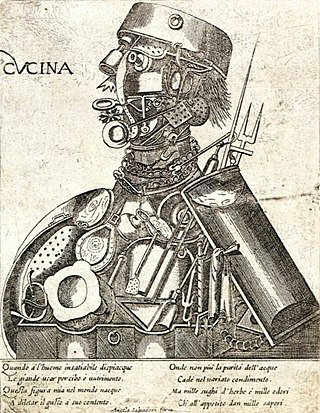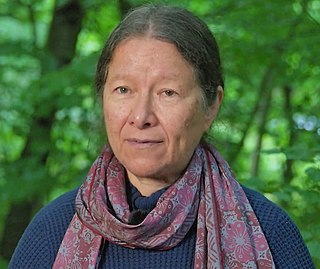Capitalism is an economic system based on the private ownership of the means of production and their operation for profit. Central characteristics of capitalism include capital accumulation, competitive markets, price systems, private property, property rights recognition, economic freedom, profit motive, entrepreneurship, commodification, voluntary exchange, wage labor and the production of commodities. In a market economy, decision-making and investments are determined by owners of wealth, property, or ability to maneuver capital or production ability in capital and financial markets—whereas prices and the distribution of goods and services are mainly determined by competition in goods and services markets.

Freeganism is an ideology of limited participation in the conventional economy and minimal consumption of resources, particularly through recovering wasted goods like food. The word "freegan" is a portmanteau of "free" and "vegan". While vegans avoid buying, consuming, using, and wearing animal products as an act of protest against animal exploitation, freegans—at least in theory—avoid buying anything as an act of protest against the food system in general.

Donna J. Haraway is an American professor emerita in the history of consciousness and feminist studies departments at the University of California, Santa Cruz, and a prominent scholar in the field of science and technology studies. She has also contributed to the intersection of information technology and feminist theory, and is a leading scholar in contemporary ecofeminism. Her work criticizes anthropocentrism, emphasizes the self-organizing powers of nonhuman processes, and explores dissonant relations between those processes and cultural practices, rethinking sources of ethics.

Matsutake, Tricholoma matsutake, is a species of choice edible mycorrhizal mushroom that grows in Eurasia and North America. It is prized in Japanese cuisine for its distinct spicy-aromatic odor.

"A Cyborg Manifesto" is an essay written by Donna Haraway and published in 1985 in the Socialist Review (US). In it, the concept of the cyborg represents a rejection of rigid boundaries, notably those separating "human" from "animal" and "human" from "machine." Haraway writes: "The cyborg does not dream of community on the model of the organic family, this time without the oedipal project. The cyborg would not recognize the Garden of Eden; it is not made of mud and cannot dream of returning to dust."
Socialist feminism rose in the 1960s and 1970s as an offshoot of the feminist movement and New Left that focuses upon the interconnectivity of the patriarchy and capitalism. However, the ways in which women's private, domestic, and public roles in society has been conceptualized, or thought about, can be traced back to Mary Wollstonecraft's A Vindication of the Rights of Woman (1792) and William Thompson's utopian socialist work in the 1800s. Ideas about overcoming the patriarchy by coming together in female groups to talk about personal problems stem from Carol Hanisch. This was done in an essay in 1969 which later coined the term 'the personal is political.' This was also the time that second wave feminism started to surface which is really when socialist feminism kicked off. Socialist feminists argue that liberation can only be achieved by working to end both the economic and cultural sources of women's oppression.
Post-capitalism is in part a hypothetical state in which the economic systems of the world can no longer be described as forms of capitalism. Various individuals and political ideologies have speculated on what would define such a world. According to classical Marxist and social evolutionary theories, post-capitalist societies may come about as a result of spontaneous evolution as capitalism becomes obsolete. Others propose models to intentionally replace capitalism, most notably socialism, communism, anarchism, nationalism and degrowth.

Criticism of capitalism is a critique of political economy that involves the rejection of, or dissatisfaction with the economic system of capitalism and its outcomes. Criticisms typically range from expressing disagreement with particular aspects or outcomes of capitalism to rejecting the principles of the capitalist system in its entirety.

Metabolic rift is a theory of ecological crisis tendencies under the capitalist mode of production that sociologist John Bellamy Foster ascribes to Karl Marx. Quoting Marx, Foster defines this as the "irreparable rift in the interdependent process of social metabolism". Foster argues that Marx theorized a rupture in the metabolic interaction between humanity and the rest of nature emanating from capitalist agricultural production and the growing division between town and country.
Karen Michelle Barad is an American feminist theorist and physicist, known particularly for their theory of agential realism.
The nature–culture divide is the notion of a dichotomy between humans and the environment. It is a theoretical foundation of contemporary anthropology that considers whether nature and culture function separately from one another, or if they are in a continuous biotic relationship with each other.

Cultural globalization refers to the transmission of ideas, meanings and values around the world in such a way as to extend and intensify social relations. This process is marked by the common consumption of cultures that have been diffused by the Internet, popular culture media, and international travel. This has added to processes of commodity exchange and colonization which have a longer history of carrying cultural meaning around the globe. The circulation of cultures enables individuals to partake in extended social relations that cross national and regional borders. The creation and expansion of such social relations is not merely observed on a material level. Cultural globalization involves the formation of shared norms and knowledge with which people associate their individual and collective cultural identities. It brings increasing interconnectedness among different populations and cultures. The idea of cultural globalization emerged in the late 1980s, but was diffused widely by Western academics throughout the 1990s and early 2000s. For some researchers, the idea of cultural globalization is reaction to the claims made by critics of cultural imperialism in the 1970s and 1980s.

Aihwa Ong is a professor of anthropology at the University of California, Berkeley, a member of the Science Council of the International Panel on Social Progress, and a former recipient of a MacArthur Fellowship for the study of sovereignty and citizenship. She is well known for her interdisciplinary approach in investigations of globalization, modernity, and citizenship from Southeast Asia and China to the Pacific Northwest of the United States. Her notions of 'flexible citizenship', 'graduated sovereignty,' and 'global assemblages' have widely impacted conceptions of the global in modernity across the social sciences and humanities. She is specifically interested in the connection and links between an array of social sciences such as; sociocultural anthropology, urban studies, and science and technology studies, as well as medicine and the arts.

Anna Lowenhaupt Tsing is a Chinese American anthropologist. She is a professor in the Anthropology Department at the University of California, Santa Cruz. In 2018, she was awarded the Huxley Memorial Medal of the Royal Anthropological Institute.
Authoritarian capitalism, or illiberal capitalism, is an economic system in which a capitalist market economy exists alongside an authoritarian government. Related to and overlapping with state capitalism, a system in which the state undertakes commercial activity, authoritarian capitalism combines private property and the functioning of market forces with repression of dissent, restrictions on freedom of speech and either a lack of elections or an electoral system with a single dominant political party.

Tricholoma murrillianum is a species of mushroom-forming fungus found in North America also known as the ponderosa mushroom, pine mushroom, and Western matsutake. It produces a choice edible mushroom but can be confused with the poisonous Amanita smithiana.

Jason Edward Hickel is an anthropologist and professor at the Autonomous University of Barcelona. Hickel's research and writing focuses on economic anthropology and development, and is particularly opposed to capitalism, neocolonialism, as well as economic growth as a model of human development.
Tania Murray Li is a Professor of Anthropology at the University of Toronto who is known for her work on labour, capitalism, development, politics and indigeneity with a particular focus on Indonesia. She is an elected member of the Royal Society of Canada.

The anthropology of technology (AoT) is a unique, diverse, and growing field of study that bears much in common with kindred developments in the sociology and history of technology: first, a growing refusal to view the role of technology in human societies as the irreversible and predetermined consequence of a given technology's putative "inner logic"; and second, a focus on the social and cultural factors that shape a given technology's development and impact in a society. However, AoT defines technology far more broadly than the sociologists and historians of technology.

The Capitalocene is a proposed epoch of human and natural history, posed as an alternative to the “Anthropocene” era. The Anthropocene is a geologic era defined by the human species' impact on the Earth, as exemplified by deforestation, mass extinction, and the introduction of manmade waste materials into the environment, but above all by anthropogenic global warming. Scholars of the Capitalocene, in contrast, attribute these changes not to humanity as such, but to the capitalist mode of production and its need for infinite growth, its dependence on fossil fuels, and its compulsion of capitalists to seek profit without regard to “external” or long-term consequences.













